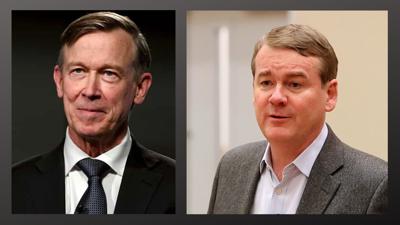Colorado’s U.S. senators are hailing the Bureau of Land Management’s finalizing of a rule to rein in methane emissions from oil and gas operations, a decade after the state adopted the first such regulation in the nation.
The BLM this week released a measure it says will curb the waste of natural gas during oil and gas production on federal and tribal land, curtailing venting and flaring of gas and requiring companies to find and fix leaks. It says the rule is expected to generate more than $50 million a year in additional natural gas royalty payments to the federal government and tribal mineral owners, and conserve billions of cubic feet of gas that might otherwise have gone to waste.
Sen. John Hickenlooper said in a news release with Sen. Michael Bennet, both D-Colo., “Colorado has led the way in reducing methane emissions. Taking basic steps to cut harmful emissions will go a long way to slowing climate change and keep pollutants out of our atmosphere. Now, the rest of the country will follow Colorado’s lead so we can meet our climate goals.”
In 2014, when Hickenlooper was governor, Colorado adopted the nation’s first regulations aimed at reducing oil and gas methane emissions. Methane is the chief component in natural gas, and also is a potent greenhouse gas. Controlling it also cuts air pollution resulting from emissions of volatile organic compounds also found in natural gas, and results in more natural gas reaching consumers rather than going to waste.
Venting and flaring of methane occur under a range of circumstances, including when companies are drilling for oil but also produce some gas but lack immediate access to pipelines to ship it.
“These practices waste valuable natural resources, risk the health of surrounding communities, and pollute the environment,” Bennet said in the release. “I’m glad BLM followed our state’s example and is taking steps to cut down on these wasteful practices on our public and Tribal lands.”

U.S. Senators John Hickenlooper and Michael Bennet.
The BLM adopted a methane rule in 2016 during the Obama administration that was challenged in court, and the Trump administration then adopted a rule effectively rescinding the earlier one. Both the Trump-era measure and then the earlier one were struck down in court, meaning BLM rules that are some 40 years old currently govern how energy producers manage methane.
The BLM says that since the 1980s, as oil and gas development on public lands rapidly grew, the percent of gas lost to venting and flaring has more than doubled. Between 2010-20, about 44.2 billion cubic feet per year was reported by federal and tribal onshore leaseholders to be vented or flared. That’s enough to serve more than 675,000 homes.
The BLM says in a fact sheet that its new rule will require companies “to either self certify their commitment to capture,” for sale or other productive use, all the gas they produce, or develop plans before drilling to minimize methane waste.
“In either case, operators will pay royalties for gas that is wasted, ensuring they are managing to avoid waste from the start of operations. The rule also requires operators to cut down on natural gas venting and flaring except in emergencies and other narrow circumstances, and to develop and submit plans for finding and fixing leaks from across their operations.”
Several states now have methane rules in place, and the federal Environmental Protection Agency recently finalized its own oil and gas methane rule, which is more far-reaching than the BLM rule that’s limited to federal and tribal lands. The BLM says its new rule “is separate and distinct from the EPA rule and ensures that operators can comply with applicable state, Tribal or federal rules while meeting these commonsense requirements.”
Holly Hopkins with the American Petroleum Institute said in a statement, “API supports a smart regulatory framework for reducing methane emissions, but overlapping regulations and lack of coordination between policymakers could hinder progress, create unnecessary barriers to development on federal lands and result in regulatory incoherence. We are reviewing the final rule to ensure it remains within BLM’s statutory authority to regulate waste of natural gas and will consider all options to prevent regulatory overreach.”













